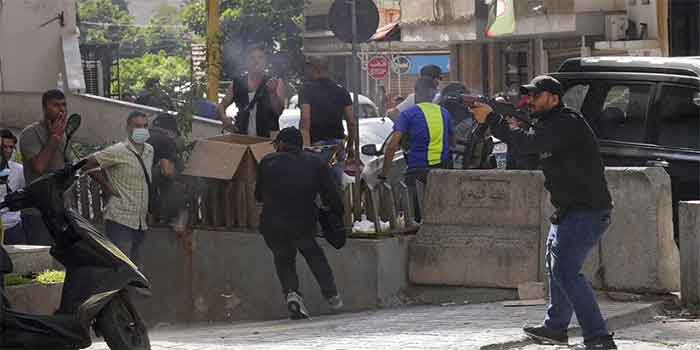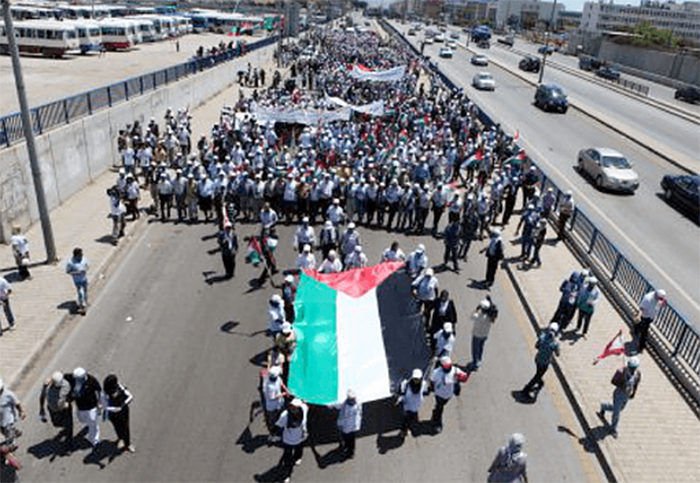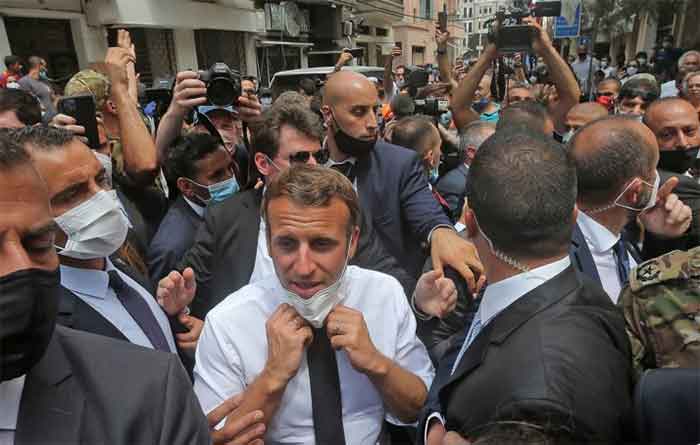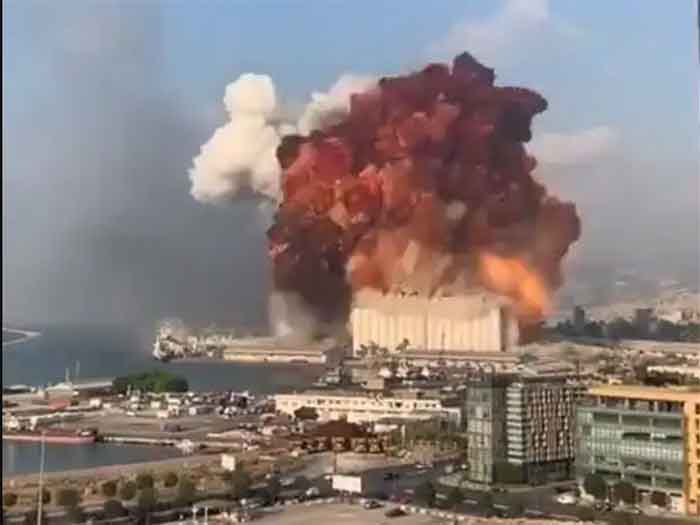
At least six people were killed and over 60 people were injured in the most violent street fighting in the Lebanese capital Beirut in years Thursday. According to the medics, all victims were shot in the head and the chest. Heavy gunfire broke out during a protest organized by the Iran-backed Hezbollah and its Shiite allies from the Amal Movement against the judge leading the probe into last year’s blast in the city’s port.
The army has deployed armored carriers and troops to quell street battles.
It was not clear who fired the first shot, but the confrontation quickly devolved into heavy exchanges of gunfire along a former civil war frontline separating predominantly Muslim and Christian areas of Beirut.
Gunfire echoed for hours, and ambulances rushed to pick up casualties. Snipers shot from buildings. Bullets penetrated apartment windows in the area. Schools were evacuated and residents hid in shelters.
The exchanges of fire along a former front line from the 1975-90 civil war involved pistols, automatic rifles and rocket-propelled grenades, and were reminiscent of that conflict. Gunfire echoed for hours, and ambulances rushed to pick up casualties. Snipers shot from buildings. Bullets penetrated apartment windows in the area. Schools were evacuated and residents hid in shelters.
The chaos raised the specter of a return to civil war in a country already embroiled in multiple crises, including one of the world’s worst economic crises of the past 150 years.
It was not clear who started the shooting, which began shortly after the start of the protest organized by the Hezbollah and Amal against Judge Tarek Bitar, who is leading the investigation into last year’s massive port explosion. Hezbollah and its allies accuse the judge of singling out politicians for questioning, most of them allied with Hezbollah.
Tensions over the port blast have contributed to Lebanon’s many troubles, including a currency collapse, hyperinflation, soaring poverty and an energy crisis leading to extended electricity blackouts.
Officials from both Shiite parties, including Hezbollah leader Hassan Nasrallah, had attacked Bitar for days, accusing him of politicizing the investigation by charging and summoning some officials and not others. They want him removed.
None of Hezbollah’s officials have so far been charged in the 14-month investigation.
The probe centers on hundreds of tons of ammonium nitrate those were improperly stored at a port warehouse that detonated on Aug. 4, 2020. The blast killed at least 215 people, injured thousands and destroyed parts of nearby neighborhoods. It was one of the largest non-nuclear explosions in history and further devastated the country already beset with political divisions and financial woes.
Bitar is the second judge to lead the complicated investigation. His predecessor was removed following legal challenges.
On Thursday, shortly before the planned protest, an appeals court turned down a request to remove Bitar from his post filed by two lawmakers who are defendants in the case, both of them allies of Hezbollah.
The calls for the judge’s removal upset many who considered it blatant interference in the work of the judiciary.
The right-wing Christian Lebanese Forces mobilized supporters Wednesday evening after Hezbollah and Amal called for the protest at the Justice Palace, located on the former front line separating predominantly Muslim and Christian areas of Beirut. Videos circulating on social media Wednesday night showed supporters of the Christian Lebanese Forces marching in the streets, carrying large crosses.
In a statement Thursday, the two Shiite groups said their protesters came under fire from snipers deployed over rooftops. Among the dead — all Shiites — were two Hezbollah members.
The army also said protesters came under fire, but later in the evening said an “altercation and exchange of fire” occurred as the protesters were headed to the Justice Palace.
The violence unfolded while U.S. Undersecretary of State for Political Affairs Victoria Nuland was in town, meeting with Lebanese officials. Her schedule was slightly thrown off by the action on the streets.
Nuland later told an airport news conference that an impartial judiciary is the guarantor of all rights, in apparent criticism of Hezbollah.
UN Secretary-General called on all parties to stop the violence and refrain from any provocative actions or inflammatory rhetoric, UN spokesman Stephane Dujarric said.
“The secretary-general reiterates the need for an impartial, thorough and transparent investigation into the explosion at the port of Beirut that took place last year,” Dujarric said.
As the clashes erupted, an Associated Press journalist saw a man open fire with a pistol and gunmen shooting in the direction of protesters from a balcony. Several men fell immediately and bled on the street. The army sent patrols to the area following the gunfire between the Muslim and Christian sides of the capital.
The Lebanese Red Cross said at least 30 people were wounded. One of the dead, a mother of five, was shot in the head. Hezbollah said it planned a funeral for the woman, and two of its fighters, for Friday. Amal, which is headed by Parliament Speaker Nabih Berri, planned a separate a funeral for two of its members.
Four projectiles fell near a private French school, Freres of Furn el Chebbak, causing panic. In scenes reminiscent of the civil war, students huddled in the central corridors. Smoke covered the neighborhoods that saw relentless gunfire.
The shooting subsided around four hours later, after army troops were deployed.
Youssef Diab, a journalist who specializes in court affairs, said the protest was meant as a show of force and a message that Hezbollah and Amal control the street. What happened showed them that they are not the only ones who control the street.
“There is another street, and confronting it could blow up the situation in a big way,” Diab said.
In a statement, Prime Minister Najib Mikati appealed for calm and urged people “not to be dragged into civil strife.”
Beirut resident Haneen Chemaly, who heads a local group that provides social services, hid with her 6-month-old baby in her building’s shelter and then at her neighbors’ home. She accused Lebanon’s leaders of steering the country into civil war, saying it is “the last card they have to use.”
“They have (driven) us into bankruptcy, devastation and now they are scaring us with the specter of civil war,” she said.
Michel Younan, a resident of Ain el-Remeneh neighborhood, said: “There were protests and then suddenly gunfire began … Shooting, RPGs, everything,” he said. “Is not this a shame? They brought us back to the days of the war.”
The clashes could derail Mikati’s month-old government even before it begins tackling Lebanon’s economic meltdown.
A cabinet meeting was canceled Wednesday after Hezbollah demanded urgent government action against the judge. One Hezbollah-allied minister said he and other Shiite cabinet members would stage a walkout if Bitar is not removed, further complicating Mikati’s mission.
During the protest march, a protester was seen holding Arabic placards that read: “Will not forget, right, down with the system of nitrates.
Claim of U.S. interference
Hezbollah lawmaker Hassan Fadallah claimed the U.S. was interfering in the investigation, seeking to implicate Hezbollah and its allies, and dictating how the probe should go.
The remarks by Fadallah were in response to U.S. State Department spokesperson Ned Price’s criticism of Hezbollah leader Hassan Nasrallah’s call earlier in the week that called for Bitar’s removal.
Price accused Hezbollah — designated a terrorist group by Washington — of being “more concerned with its own interests and those of its patron, Iran, than in the best interests of the Lebanese people.”
Fadlallah said Price’s comments are a “new violation of Lebanon’s sovereignty” that exposes “the extent of interference aimed at controlling and steering the investigation.”
Families of the victims of the port explosion, which killed at least 215 people, injured thousands more and devastated entire neighborhoods of the Lebanese capital, have rallied behind Bitar. On Wednesday, they warned against removing the judge and demanded the Cabinet to stay out of the judiciary’s affairs.
“Keep your hands off the judiciary,” said the families in a statement.
Hezbollah’s comments were the first to accuse Washington of interfering in the port probe, signaling that the militant group was escalating the campaign against the 46-year-old judge. Rights groups say the development seeks to discredit the investigation.
It is unclear how Lebanon’s new government of Prime Minister Najib Mikati will react. Only Lebanon’s highest court can remove Bitar. A government-appointed body can, however, take disciplinary action against him.
Bitar has issued arrest warrants against two former government officials, a rare move against the entrenched political elites in Lebanon, where impunity has prevailed for decades. The two remain at large.
Lebanon was without a fully functioning government for over a year amid political haggling over its composition and as the nation sunk deeper into an unprecedented financial crisis and economic meltdown. Mikati and his Cabinet took office last month.
Elie Hasrouti, whose father was killed in the port explosion, said the families of the victims would not waver in their quest for justice. They hold Lebanon’s political elite responsible for the explosion and say many knew of the explosive chemicals improperly stored at the port.
Lebanon Pauses After Deadly Gun Battles
Schools banks and government offices across Lebanon shut down Friday after hours of gun battles between heavily armed militias killed six people and terrorized the residents of Beirut
The government called for a day of mourning following the armed clashes
The two Shiite groups said their protesters came under fire from snipers deployed over rooftops, accusing the Christian right-wing Lebanese Forces militia of starting the shooting. Among the dead — all Shiites — were two Hezbollah fighters.
On Friday, residents in the Tayouneh area of Beirut were most of the fighting played out, swept glass from the streets in front of shops and apartment buildings. Soldiers guarded the entrance to the battered neighborhood, and barbed wire was erected at street entrances. Many cars were damaged.
Tayouneh has a huge roundabout that separates Christian and Muslim neighborhoods. Newly pockmarked buildings sat next to ones scarred from the days of the civil war.
Sectarian Politics
A Reuters explainer said:
The latest bloodshed adds to the woes of a country suffering one of the world’s worst ever economic meltdowns.
The crisis over the probe is rooted in one of Lebanon’s main problems: sectarian politics that have divided Lebanese and fuelled civil conflict since independence. Shi’ites and Christians have lined up on opposite sides of this standoff.
Some of the most prominent suspects sought for questioning on suspicion of negligence are Shi’ite allies of the heavily armed, Iran-backed Shi’ite group Hezbollah.
Lead investigator Tarek Bitar issued an arrest warrant for one of them this week, Ali Hassan Khalil, a former finance minister who is the right-hand man of Shi’ite Parliament Speaker Nabih Berri, a close Hezbollah ally.
Bitar has also sought to question non-Shi’ite officials. These include the former prime minister Hassan Diab, a Sunni, a Christian general, and a senior Christian politician, Youssef Fenianous, a Hezbollah ally.
While hitting fierce Shi’ite pushback, the probe has enjoyed broad Christian backing even from Hezbollah’s main Christian ally, President Michel Aoun. This has generated friction between Aoun’s party and Hezbollah, political sources say.
The issue is sensitive for the Christian parties partly because, while the port blast killed many Muslims, the bulk of the physical damage was in predominantly Christian areas.
One of the World’s Sharpest Economic Depressions
The explainer said:
The latest bloodshed takes place against the backdrop of one of the world’s sharpest economic depressions, which spiraled from the meltdown of its financial system in 2019.
The collapse, which has driven some three quarters of Lebanese into poverty and sunk the currency by 90%, was caused by decades of financial mismanagement and corruption by the sectarian elite.
The new government of Prime Minister Najib Mikati has vowed to revive negotiations with the IMF to secure a rescue package.
But Lebanon must first agree on the size of vast losses in the financial system and how they should be shared out – something the government, banks and central bank failed to do last year.
In the meantime, Lebanon’s collapse is driving ever more people to emigrate, in a braindrain across the sectarian spectrum which economists say will set back Lebanon for years.
Foreign Influence
Lebanon’s web of sectarian rivalries is complicated by foreign interests.
Lebanon’s power balance has been tilting in favor of Hezbollah and its allies for years, and away from factions that aligned themselves with Western governments and Sunni-led Gulf Arab states that have largely given up their Lebanese allies.
Hezbollah, which was founded by Iran’s Revolutionary Guards and has become more powerful than the state, views the probe as part of a U.S.-backed campaign to chip away at its influence and has accused Washington of meddling in the investigation to serve its anti-Hezbollah agenda.
Washington this week condemned what it called the group’s intimidation of the judiciary. France has also stood by the probe, saying it must take place in an independent and impartial manner.
While Saudi Arabia has turned away from its old Sunni Muslim Lebanese ally, Saad al-Hariri, it has good ties with militia commander Samir Geagea.
Iran
Another media report said:
Iran blames Israel for Beirut blast investigation killing of protesters
Iran condemned the killing of protesters in Lebanon, describing Thursday’s shootings as seditions backed by Israel, state-run Press TV said on Twitter on Friday.
Army Identifies Riots Instigators
A media report said:
The instigators and participants of armed riots in Beirut that led to the deaths have been identified, Al Mayadeen reported Thursday citing the Lebanese Army.
Meanwhile, the Hezbollah and Amal Shia movements accused the right-wing Christian political party Lebanese Forces of the incident.
“The attack on a peaceful protest was carried out by the Lebanese Forces political party groups, who dispersed across the neighboring quarters, occupied the rooftops and opened direct sniper fire,” the two movements said in their joint statement. “This attack was a deliberate criminal act, aimed at undermining stability and the public peace.”
The Lebanese Forces leader Samir Geagea urged the president and the prime minister to investigate the attack.
The Lebanese Army said in a separate statement later in the day that nine people had been arrested following the shootings, including a Syrian national.
Prime Minister Najib Mikati called for the arrest of those responsible for the shootings as he appealed for calm on Thursday. He urged people “not to be dragged into civil strife.” Mikati also said Friday will a national day of mourning for the lives lost in the violence.
Lebanese President Michel Aoun called the day’s events “unacceptable” and said those held responsible for the violence will be held accountable.
Former Lebanese Prime Minister Saad Hariri said the clashes were reminiscent of the country’s deadly civil war, which lasted between 1975 and 1990.
Threat of Political Escalation
Human rights groups and families of the blast victims see Bitar as a guarantor of justice for those affected by the deadly blast, which occurred on August 4, 2020.
But a member of the Amal group on Tuesday threatened “political escalation” if the investigation “was not rectified.”
A Fertile Ground for a Civil War
A France24 report said:
A video showed, one person on a rooftop fires his weapon. The France24 Observers team was able to pinpoint the location of these images: they occurred in the adjacent neighborhood of Ain El Emmaneh, near Old Saida Road.
Joumanah Zabaneh was at home when she heard the first shots ring out. She said:
My main worry was for my husband who works in the Tayouneh neighbourhood, and for my children, whose school is close to the site of the unrest. I went out, still in slippers, to go get them and I found my husband outside of the school. There were a lot of parents there in a panic.
We returned home but the way that usually takes us ten minutes took us half an hour. We heard the shots, they were about a kilometer away. We hid regularly, behind a car, behind a tree. My biggest fear was to be hit by a stray bullet – there have been plenty of victims of this in Lebanon. When we got home, I put the children in the hallway, it’s the safest place without any windows. My older daughter is 8 years old and she is already traumatized by the Beirut port explosion, she was treated for that. And now I have to explain to her what is happening and I don’t know what to say.
On TV, we heard that the army said they were controlling the situation, but at the same time, I heard shots. How can you claim that the army is controlling anything?
I was born in 1976 and I lived through the civil war. What I did this morning is exactly what my parents did: go get the children from school, run and hide at home in fear. There have been major mobilizations lately, people who protest, others who counter-protest. When you’ve been through the civil war and then you see this, I can tell you that it makes you think it could happen again.
I think we will soon know what will happen: if the parties don’t reach an agreement, it means that there is a risk of falling back into civil war. And what we saw today shows that they are ready to go back to civil war. We saw snipers on the buildings, it’s not normal. We saw people very tense, defending their politics. It’s fertile ground for a civil war.
Jamil B, a communications manager, lives in Beirut, said:
Kataeb [a Christian political party also known as Phalanges] militants carried out an attack targeting a bus on April 13, 1975 in the Ain El Remmaneh neighborhood. It was in an avenue separating a Shiite neighborhood from a Maronite neighborhood, and is at the root of the civil war that lasted 15 years.
For 15 years, members of the Lebanese Forces [a Christian militia] posted in the Ain El Remmaneh area exchanged fire with their enemies in the Shiite Amal Movement, who operated in the Tayouneh area. That is not much different from the scenes we saw today.
The neighborhood had been deserted by the civilian population and was in the hands of armed groups for a long time.
So today’s unrest reminded us of these painful memories of the war. I saw how people ran in a panic through the streets to escape the bullets.
Lebanese people are really afraid. We are afraid that these clashes will spread to other neighborhoods, other towns and that we will slip into a new civil war.
My family, who live in a village in the south of the country, asked me to come back. I will wait and see.
















































